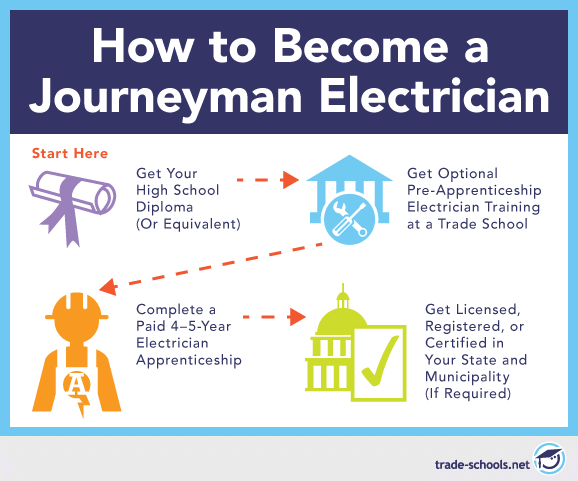Find an Electrician Trade School Near You
Through pre-apprenticeship training, an electrician school near you can give you a good start on the path to becoming a licensed journeyman. People entering the electrical trade can benefit from good wage potential, enhanced career stability, satisfying workplace variety, highly engaging job tasks, and other advantages.


Electrician Training
Today, one of the most common paths to becoming a licensed electrician involves a combination of formal technical schooling and hands-on apprenticeship training. That's because most states require a certain amount of classroom hours and electrical work experience before you can become officially licensed or certified as an electrician.
Electrician Schools
Sponsored Listings



Lincoln Tech
- Electrical/Electronics
Lincoln Tech
- Denver
- East Windsor
- New Britain
- Shelton
- East Point (Atlanta)
- Marietta (Atlanta)
- Melrose Park
- Indianapolis
- Columbia
- Mahwah
- Union
- Queens
- Allentown
- Lincoln
- Grand Prairie
- Electrical/Electronics
UEI College
- Mesa
- Phoenix
- Bakersfield
- Chula Vista
- Garden Grove
- Gardena
- Huntington Park
- Oceanside
- Ontario
- Reseda
- Riverside
- Sacramento
- Stockton
- West Covina
- Electrician Technician
United Education Institute
- Morrow, Georgia
- Stone Mountain, Georgia
- Las Vegas, Nevada
- Albuquerque, New Mexico
- Houston, Texas
- Dallas, Texas
- Electrical Technology
Tulsa Welding School
- Jacksonville, Florida
- Tulsa, Oklahoma
- Dallas, Texas
- Houston, Texas
- Electrical Applications
- Electrical Technologies
- Electro-Mechanical Technologies
The Refrigeration School
- Phoenix, Arizona
- Electrical Applications
- Electro-Mechanical Technologies
Fortis
- Birmingham, Alabama
- Wayne, New Jersey
- Lawrenceville, New Jersey
- Electrical Systems Technology
- Electronic Systems Technician
Porter and Chester Institute
- Career Industrial, Commercial and Residential Electrician
- Electrical Technology
San Joaquin Valley College
- Phoenix
- Bakersfield
- Fresno
- Hesperia
- Modesto
- Ontario
- Rancho Mirage
- San Leandro
- Sacramento
- Temecula
- Visalia
- Electrical Technology
Florida Technical College
- DeLand
- Kissimmee
- Lakeland
- Orlando
- Pembroke Pines
- South Miami
- Tampa
- Electrical
- Electrical with PLC
How to Become a Journeyman Electrician: A Quick Summary
The path to becoming a journeyman electrician can vary a bit from state to state, especially when it comes to licensing requirements. That's why seeking additional information from your state government or electrician schools in your area is important. That said, here are the most common steps that you'll probably need to take:
- Get your high school diploma, GED, or equivalency certification.
- Consider completing some pre-apprenticeship electrician training at a trade school.
- Find and apply for an electrician apprenticeship.
- Register as an electrical apprentice or trainee (if your state requires it).
- Complete your paid apprenticeship, which may take four to five years.
- Apply for and get your state electrician license, along with any required licenses or certifications in your municipality. This step may require you to pass an exam that tests your knowledge of the National Electric Code, local regulations, and other aspects of the trade.

Benefits of Electrician Trade School
Better chances of landing a suitable apprenticeship: Electrical apprenticeship openings tend to get many applicants, so you need to be more qualified than your competition. Finishing a short electrical technology program at a trade school shows that you have the commitment to stick with your training and the ability to hit the ground running as a new apprentice.
A forgiving learning environment: You may feel more comfortable practicing necessary trade skills in a school setting than under the watchful eye of an employer who's paying you to learn. School instructors often provide their students with greater freedom to make mistakes. Plus, many trade schools offer free tutoring if you need extra help learning math or other related subjects.
Greater confidence and credibility: Your trade school electrician training can help you feel self-assured as you begin an apprenticeship. By demonstrating that you already know the basics, your trainer and co-workers may take you more seriously than if you were completely new to the field.
How Long is Electrician Training
Depending on the program, it generally takes seven to 24 months to complete pre-apprenticeship training through an electrician school, with certificate programs being shorter and associate degree programs taking up to about two years.


Electrician Program Options
 Many electrician trade schools offer pre-apprenticeship programs that provide a valuable head start. Completing such a program may even count toward a future apprenticeship, allowing you to begin one at a more advanced level. (Some or all the classroom requirements may be waived.)
Many electrician trade schools offer pre-apprenticeship programs that provide a valuable head start. Completing such a program may even count toward a future apprenticeship, allowing you to begin one at a more advanced level. (Some or all the classroom requirements may be waived.)
Certificate and diploma programs tend to be short and career-focused, with the curriculum focused on teaching concepts and hands-on skills related to the electrical trade. Most certificate and diploma programs can be completed in under a year. You might choose this option if your goal is simply to prepare for an apprenticeship as quickly as possible.
Associate degree programs may offer the same type of training but also include some general education courses. They're often designed to take about two years. This might be a better option if you want extra flexibility for your future. It still provides pre-apprenticeship training in a relatively short amount of time. In some states, you may have a better chance to apply the credits you earn through an associate degree program toward the required classroom hours of your apprenticeship.
Electrician apprenticeships involve working under the supervision of a licensed journeyman or master electrician for up to four or five years, according to the Occupational Outlook Handbook (OOH). Here's what else you should know:
- Many employers and organizations that hire and sponsor apprentices look more favorably upon students who've attended nearby electrician schools.
- Most apprentices are employees in training and get compensated for their work.
- The OOH says that electrician apprenticeships generally involve about 2,000 hours of hands-on training per year in addition to classroom instruction.

Licensing & Certification
In most states, after you have successfully completed your training, you must get licensed before you can legally work unsupervised as an electrician. That generally requires passing a licensing exam after proving you've accumulated enough hours of classroom learning and real-world work experience.
A license will usually only allow you to work within the specific municipality or state you took the examination. However, some interstate reciprocity agreements exist, meaning that depending on where you live, you may be able to use your license in other states.
Some states have multiple levels of electrician licensing requirements (including some below the journeyman level). However, in many regions, once you have successfully passed the relevant licensing examination, you will officially become a journeyman electrician. As a journeyman, you may be legally allowed to perform almost all types of electrical work. (Some states restrict journeyman electricians from designing electrical systems.)
Becoming a Master Electrician
After becoming a licensed journeyman electrician, you may choose to advance your career and pursue the master electrician designation. You will likely need to meet additional requirements before taking a master electrician examination within your state or municipality.
Once you have passed a certification exam, you will be legally allowed to perform more advanced work, including planning and designing electrical systems. You can also take on supervisory or management roles.
As a master electrician, you may also become a private electrical contractor by getting a business license and starting your own company.


Electrician Training FAQs
What are the requirements for training at an electrician school?
 A high school diploma (or its equivalent) is typically necessary to begin electrician training. Also, there may be entrance testing requirements depending on the school and program you're interested in.
A high school diploma (or its equivalent) is typically necessary to begin electrician training. Also, there may be entrance testing requirements depending on the school and program you're interested in.
How much do electrician programs cost?
Expenses vary depending on the particular school and level of education you choose. According to the U.S. Department of Education's College Affordability and Transparency data for the 2022-2023 school year, the average electrician school cost (tuition and fees) was $17,123 for programs in the "electrical and power transmission installers" category. Some programs were as little as $1,445, whereas one 24-month program was more than $47,000. Keep in mind that many students qualify for financial aid.
What do apprentice electricians get paid?
An electrical apprentice earns about half of what a fully qualified electrician makes. Generally, your wages increase as your skills and understanding of the job improve.
Do I need to be good at math to be an electrician?
You will need to learn some math and use it on the job. However, some people find that thanks to their training, they can handle doing math in the electrical trade even though they weren't good at math in high school. That's because applying mathematical concepts to practical, real-world situations makes them easier to learn.
Where can I learn how to become an electrician?
Use our search tool to find electrician schools near you and learn more about training for this skilled trade. Here, you can learn about training programs and request more information from schools that interest you.
Electrician Career Information
 The electrical trade offers numerous opportunities for satisfying work, good wages, and specialization. Many electricians also enjoy excellent job security thanks to a steady demand for their critical skills.
The electrical trade offers numerous opportunities for satisfying work, good wages, and specialization. Many electricians also enjoy excellent job security thanks to a steady demand for their critical skills.
Earnings
According to the OOH, the median electrician salary was $61,590 in 2023. The top 10 percent of earners in this trade made more than $104,180.
Job Openings & Outlook for Electricians
Projections from the Bureau of Labor Statistics (BLS) show that the number of electrician jobs could grow 11 percent from 2023 to 2033.
Journeyman Electrician Jobs
Journeyperson electricians have completed their training and have obtained licensing or certification as per their state's requirements.
Once you have advanced from the apprentice to the journeyperson level, you will likely be qualified to complete most electrical work independently. You can carry out the duties you performed as an apprentice and, in many instances, will not require supervision or approval. Depending on the type of work and the state you're in, you may still need to work under a master electrician.
Master Electrician Jobs
A master electrician is essentially the lead electrician. They oversee all the work that journeypersons and apprentices complete. Master electricians design plans, create layouts, identify the wiring and connections to be used, and obtain necessary permits.
Electrician Jobs: What are the Main Categories and Specializations?
 People in the electrical trade can pursue many different areas of focus. Some electricians prefer to specialize in installation (such as for new construction or renovations). Others choose to focus on maintenance and repair. And some electricians decide to branch out into very particular industries that often require additional training, certification, and other qualifications. Here are the four main areas of electrical work, plus some additional electrician specialties worth noting:
People in the electrical trade can pursue many different areas of focus. Some electricians prefer to specialize in installation (such as for new construction or renovations). Others choose to focus on maintenance and repair. And some electricians decide to branch out into very particular industries that often require additional training, certification, and other qualifications. Here are the four main areas of electrical work, plus some additional electrician specialties worth noting:
1. Residential work: Residential electrician jobs focus solely on the electrical systems within people's homes, including new homes under construction. You could be responsible for installing new electrical systems or troubleshooting, repairing, and servicing existing systems.
2. Commercial work: Commercial electrician jobs tend to focus on the electrical systems within office buildings, restaurants, shopping malls, retail stores, and other commercial spaces.
3. Industrial work: Industrial electricians must possess knowledge specific to manufacturing facilities, power plants, and other industrial settings. They must also be confident when working with high-voltage and direct-current power systems. Many companies have intensive in-house training programs so that their electricians have the specialized knowledge that is required to work within their facilities.
4. Maintenance Work: Maintenance electrician jobs focus strictly on working with existing electrical systems in many settings, including residential, commercial, and industrial. They identify problems and replace or repair electrical components as needed. They must identify and fix problems as quickly as possible since it could mean that a family cannot live in their home or a factory cannot operate until the repairs are completed.
Electrician Specialties
Offshore electrical work: Find these positions within the energy sector in areas like offshore oil and gas operations or wind farms. Many positions will require you to have advanced education in electrical engineering and specialized knowledge about the types of equipment used in the field.
Lineman work: Work for power companies on outdoor high-power transmission and distribution lines and systems. Lineworker jobs typically exist with major electric utility companies, and you could find yourself working on overhead and underground power lines as well as other electrical subsystems and components.
Marine technology: Work on electrical systems and equipment on boats and ships. You could take care of anything related to installation, maintenance, and emergency repairs. Marine electricians must be aware of the extra precautions needed to conduct electrical repairs with water present.
Signage and highway systems: Help fix, maintain, or install traffic lights, pole lighting along streets, airport runway lights, or lighted signs or awnings on buildings or detached structures.
Fire alarm and security systems: Focus on installing or repairing low-voltage systems that help protect buildings and their occupants from blazes, theft, acts of vandalism, or other threats.
Telecommunications: Contribute to the installation and repair of underground or overhead cable, Internet, or phone lines used for transmitting video, data, and voice calls.
Solar energy: Play a vital role in the nation's transition to renewable sources of electricity by gaining skills for installing and maintaining solar photovoltaic panels and related systems. Training at a solar energy school can help prepare you to pursue careers in the renewable energy sector.
Wind energy: As a wind turbine technician, you could help install and maintain massive outdoor turbines that generate clean electrical power from the air's natural movement.
Electrical inspection: Closely examine the wiring and other electrical components in buildings that are being constructed, renovated, or sold to ensure that everything is safe and up to code.
Electrical and light work for filmmaking (gaffer): You could be responsible for designing, setting up, controlling, and maintaining the lighting systems for productions. You would likely oversee the other lighting personnel as well.


Trade School Is a Valuable Way to Begin
Going to an electrician school near you has several potential advantages. Trade school programs offer dependable and convenient ways to prepare for electrician apprenticeships. And completing your apprenticeship is the first step toward becoming a journeyman electrician, and maybe someday a master electrician.
The future of the electrician trade looks strong, and the electrical trade offers plenty of satisfying careers with high wages and good job security, so take your first step now and find the electrician program best suited for you!
Featured Electrician School Locations:












